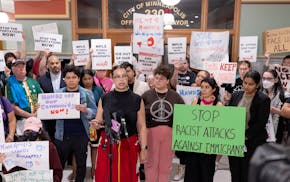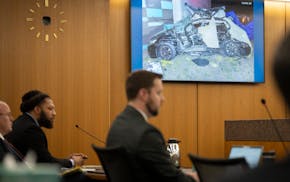As Bloomington grew up, the Thunderbird Motel, with its kitschy midcentury signage, was a local landmark.
Soon, the city plans to turn the site where it once stood near Interstate 494 and Hwy. 77 into a bicycle park — at least until they can find a better use.
This week, the Bloomington City Council voted to buy the nearly 12-acre property from the city's Port Authority, which bought it for $18.5 million a decade ago and demolished the Thunderbird-turned-Ramada Inn. Since then, the Port Authority has struggled to find a suitable developer.
"We do get inquiries for this site, but the development landscape has been very challenging," said Holly Masek, Bloomington's Port Authority administrator.
City officials say they aren't giving up, but the site is facing the end of a tax exemption deal this year, prompting Bloomington authorities to look for ways to keep that status until it can find a suitable development plan for the high-profile site that was once home to a local landmark.
Thunderbird/Ramada history
When it was built in 1962, the Thunderbird was near the then-Metropolitan Stadium, where the Twins and Vikings played, and was the first Bloomington establishment to have a liquor license, according to the Bloomington Historical Society.
Despite criticism for its lack of cultural sensitivity toward Native Americans, the Thunderbird remained a time capsule of birchbark canoes, taxidermy, and conference rooms named after tribes into the 2000s. It became a themeless Ramada, before the Port Authority bought the land to save it from low-density development and demolished it in 2016.
The parcel was pitched for use in Bloomington's failed World Expo bid to Belgrade, Serbia. With higher interest rates and construction costs, Bloomington hasn't found the kind of "high-intensity" development pitch it's looking for at the high-profile spot, Masek said.
Enter the bike skills park plan, which would keep the parcel tax-exempt as a public use, bringing in temporary ramps, jumps and paths for cyclists later this year.
"We all still think the site is very important, but the development environment is very challenging right now, so our goal at this point in putting it into public use is to give it another life," she said.
A company associated with the Mall of America has a right of first refusal to purchase the property but has agreed not to exercise it. The city bought the land from the Port Authority for $1.
Why the bike park?
As the South Loop area has added housing, residents have asked for amenities.
A bike park is a relatively easy install, and a way to provide accessible recreation that complements mountain bike trails along the Minnesota River and paved bike paths, said Renae Clark, Bloomington's assistant director of parks and recreation.
"It's something that's accessible to a lot of ages," she said. "Different abilities, new riders, teens — which is a hard demographic to serve. And it promotes teen-family gathering."
The bike park's temporary fixtures will cost the city about $6,000, and the park will also require portable toilets, trash, signage and other maintenance.
The plan is for the bike park to be in place until development of the site, Clark said. The city would discuss the potential incorporation of public space in any development.

Minneapolis City Council lowers street food cart license fee, hoping fruit sellers will hawk legally

How the federal raid unified the fractious Minneapolis City Council against Trump, sort of
Trump travel ban 'cruel,' Minnesota advocacy group says

No verdict after first day of jury deliberation in Derrick Thompson murder trial for crash that killed 5

